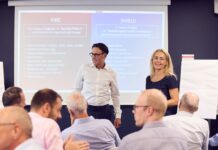By Ripin Kalra
Moving towards a greener economy is creating opportunities for the introduction of new clean technologies, green investments and jobs. Ripin Kalra, Senior Fellow at the University of Westminster, goes into detail about the thorough vetting process needed to acquire the necessary skills as we transition into more green pastures.
This article presents an unprecedented business opportunity emerging from the transition of societies and economies in cities towards net zero. With cities responsible for more than 60 per cent of global greenhouse gas emissions (GHG), Wang and Kalra (ICF, 2021)1 propose that “as a minimum, 80 per cent of the reduction targets should be achieved by tangible mitigation measures rather than offset by an equivalent amount of CO2 absorption”, with such targets embedded into policy and legislation, as well as comprehensive transition plans for practical action.
In the aftermath of the global pandemic, the World Bank (2020)2 further recommended that to fully recover from the aftermath of the pandemic, future growth should be green, resilient, and inclusive (GRI), by making efficient use of resources, being able to withstand (natural and human-made) shocks and stresses, and benefiting a wide range of social groups, including the most economically and socially vulnerable. Any tangible actions towards net zero would therefore be more economically, environmentally, and socially sustainable if they were fully aligned with the above GRI principles.
Therefore, translating net zero ambitions into practice will require tangible measures across all aspects of society and almost all sectors of infrastructure and the economy that have a direct influence on GHG emissions. The profile of these emissions can vary significantly by city, but sectors that hold potential for big changes, such as transport, utilities, buildings, and manufacturing, have a few traits in common around the characteristics of skills, systems, and standards:
- They engage both highly skilled and unskilled workforces in the lifecycles from planning to operations.
- The elements that comprise the “system”, for instance a transport system, can have multiple weak links that will require upgrading, redesign, or replacement.
- The sectors have been built using layers of design guidance and standards, some of which are now obsolete in the context of GRI requirements.
Skills, systems, and standards (or guidance) are therefore at the core of the tangible measures that will make up the transition of cities and city regions towards net zero. Policymakers and leaders need not only to embed the priority measures into policy, but also to develop clear investment plans for the development of a suitably skilled workforce, system upgrades, redesign, or replacement, and the introduction of appropriate design standards that are embedded within everyday delivery practice.
These three areas of investment present an unprecedented business opportunity that leaders and policymakers could ably support through policies, fiscal planning, and governance decision-making.
What might transition in these three areas look like?
Build green skills: The transition to new approaches and technologies that will lead to net zero will require innovation, planning, design, operation, maintenance, and often replacement at the end of their designed life. New skills, behaviours, and capacity at every level in government, private sector, and communities will be necessary for the transition to be operational.
System: Future systems that deliver net zero in a resilient and inclusive manner will have a level of redundancy built in, such that systems can not only be efficient in preventing GHG but also be able to withstand and operate at a critical level during natural hazards such as earthquakes or floods. Again, innovation, planning, and diligent operations are key to system performance and, together with a suitably skilled workforce, this is an area of investment that is not only bankable but also presents recurring business operations opportunities in supporting city governments in building and operating efficient and resilient systems.
Design guidance and standards: There are a number of international standards development organisations (SDOs) that are anticipating the need for revised standards, codes, and guidance for greener, resilient, and inclusive set-ups and products to assist cities in meeting their net zero targets. One such organisation, IEC (the International Electro-Technical Commission), has “more than 2,000 publications that directly impact safe and sustainable urbanisation” (Mouyal, IEC e-tech, 2021)3. For instance, ‘‘the IEC 61400 series of standards addresses external conditions for offshore wind turbine design’’, an important sector for transition to net zero. Standards, although remaining voluntary, present a significant route for investors and suppliers to ensure that their business plans and models are also GRI-aligned.
City governments require support, know-how, and delivery capacity from the private sector and communities in addressing the three pillars of skills, standards, and systems underpinning the transition to net zero. This presents a unique business opportunity that can contribute to society, environment, and economies in an unprecedented manner.
This article is originally published on September 26, 2022.
About the Author
 Ripin Kalra leads ICF’s urban analytics, planning, and climate resilience work, with a significant focus on nature-based solutions, transition for green skills & livelihoods, urban development, and resource-efficient development. He has also co-founded the Urban, Gender and Inclusion Lab at ICF. As Senior Fellow, University of Westminster – Ripin leads post-graduate teaching and research on Environmental Assessment, Policy and Climate Change. During his career, he worked on urban-resilience and risk-reduction projectsa in more than 30 countries while in senior and leadership positions in global engineering, multi-disciplinary and integrated-planning firms and implemented low/ zero carbon developments in Asia and Africa. In his work, Ripin collaborates extensively with public and private sector clients, urban local authorities, international financing institutions, foundations, and NGOs.
Ripin Kalra leads ICF’s urban analytics, planning, and climate resilience work, with a significant focus on nature-based solutions, transition for green skills & livelihoods, urban development, and resource-efficient development. He has also co-founded the Urban, Gender and Inclusion Lab at ICF. As Senior Fellow, University of Westminster – Ripin leads post-graduate teaching and research on Environmental Assessment, Policy and Climate Change. During his career, he worked on urban-resilience and risk-reduction projectsa in more than 30 countries while in senior and leadership positions in global engineering, multi-disciplinary and integrated-planning firms and implemented low/ zero carbon developments in Asia and Africa. In his work, Ripin collaborates extensively with public and private sector clients, urban local authorities, international financing institutions, foundations, and NGOs.
References
- Wang, S. & Kalra, R., (2021 August) “How cities can achieve net-zero carbon emissions by 2050”, ICF.
- World Bank (2020) ‘Laying the Foundations for a Resilient Recovery’
- Mouyal N (2021) ‘Helping cities cope with disasters’, IEC e-Tech. Helping cities cope with disasters | IEC e-tech


































